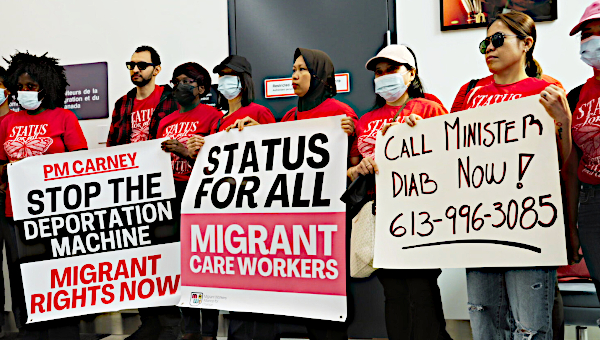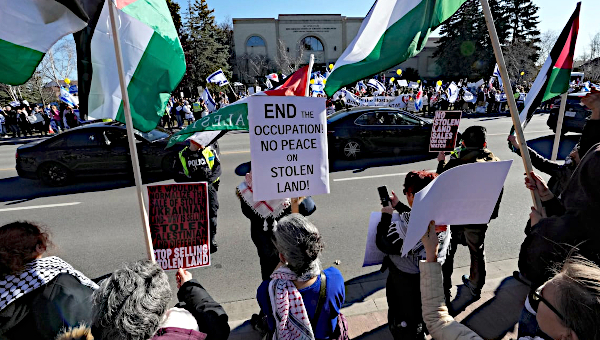Interview with KI Political Prisoner Cecilia Begg
Cecilia Begg is the Head Councillor of Kitchenuhmaykoosib Inninuwug (KI) First Nation in Northern Ontario. She is the lone female community leader in what has come to be known as the KI6, a group serving six months for contempt after blockading a mining company from its licensed operations on disputed land near their community (See Bullet No. 95). In her first interview since her incarceration, she spoke with The Enterprise’s Jon Thompson at the Kenora jail about the road that has led her to this point, the reasons she is fighting the development, and the path that she hopes will emerge from her imprisonment.
Jon Thompson (JT): The land entitlement claim that KI filed back in 2000 had been licensed to junior mining company, Platinex. Did that claim have anything to do with the fact that the government licensed a mining operation on the traditional territory of your people?
Cecilia Begg (CB): We’re still trying to get the Treaty Land Entitlement (TLE). That was one of the things we asked for. A solution has to accommodate (the government) revoking the license to Platinex.
JT: How do you feel it would affect your community if the Platinex mine were to go ahead?
CB: From the way things are, it would be a drastic change for our community. It would endanger the animals, our tradition and the culture of our people.
JT: On September 24th, 2007, Platinex company employees were met at the KI airport by members of the community. They then charged you and the others with contempt, which you did not defend in court. What really happened that day?
CB: They came into town and they were going to set up an office in the community and then fly into the site. They were there to do what they called archeological studies. We had been saying no all along and they came anyway. They were met outside the plane and told they weren’t welcome in the community; that we were adamant about fighting for our land. They finally left later in the day. I left that morning for a meeting down south but I was in the party that blockaded their entry to our land.
JT: You’re a mother, a grandmother, and a great grandmother. A lot of the mobilization around your political struggle has related to your being a woman. Can you explain the connection?
CB: Three years ago, I decided that if it came to doing a jail sentence to defend our land, I would. I could have got out of it. When we were first sentenced, I met with (Nishinawbe Aski Nation Grand Chief) Stan Beardy and (Assembly of First Nations National Chief) Phil Fontaine. They were concerned that I was the only female serving a jail term and that maybe their lawyers could work towards an appeal process. But since I’m the only female, I felt the importance to go through with it and I wanted to stand by my original decision until such time as we get a positive answer to what we’re asking for.
In our culture, it’s important to show respect to the females. They are the ones who are mothers, grandmothers, great grandmothers, elders. You go on with things in that process. We’re doing this on behalf of the ladies back home. They play an important role.
JT: The women of Nishinawbe Aski Nation’s Women’s Council are fasting today to raise attention to your story. They’re saying that in jailing you and the other imprisoned leaders, the Ontario government is creating heroes. How do you feel about that?
CB: I don’t know. My being in jail fighting for what I believe is ours: our rights, our land, for future generations. It’s not about me, it’s about the people back home. I appreciate their support.and the support from all over.
I want people back home to know that I’m doing all right. I have the support and prayers of many. In our culture it’s encouraged to put the creator ahead of everything. That’s what I believe in.
JT: Did you see the demonstration marching by the jail last Saturday for you?
CB: The glass is real thick upstairs so we couldn’t get a clear view but we could hear the drumming and we could see the colours and that there were many people. That meant a lot to me, especially seeing so many people from back home who were able to join the rally.
JT: One of the concerns from John Cutfeet (who negotiated on behalf of KI) was that the 2006 court ruling required the government to consult First Nations before companies could begin operations. In his words to me last summer, “First Nations gained the right to sit at the table, but they don’t have the right to leave the table”. To him, that wasn’t legitimate consultation. What needs to be included in the consultation process that is not included now?
CB: To go back to square one and ensure the proper steps are taken this time. There has to be changes. We have to be properly notified, if there are even surveys going on. That has to happen before anything happens. The camps up North, there are signs of the land being staked. Land is being surveyed over the summer and winter with no consultation. Our treaty rights have to be respected.
JT: In an interview with Aboriginal People’s Television News, new provincial Aboriginal Affairs Minister Michael Bryant said the government is working to overturn the decision that put you in prison, and that the crown had never asked for imprisonment. What does that support mean to you and what do you think is going to happen?
CB: I’m not sure. I’ve been talking with people from back home and what the minister is passing on is not entirely true. They say he lied about the number of times he has been there. Once, he made a press release prior to coming to our community saying that we’re coming to some sort of an agreement. We hadn’t reached any sort of agreement with him. That didn’t sit well with us.
JT: What do you think is going to happen at the end of your sentence?
CB: I’m just taking it a day at a time, trying to get as much information as I can from back home. It’s a long process, trying to get information. I haven’t been able to speak with the other men (imprisoned in Thunder Bay) until today. We’re encouraging each other by knowing we’re doing fine. That’s all we can do.
JT: Is there any chance that there could be any sort of agreement with the company?
CB: At the moment, the answer is still no. We haven’t changed. It will be up to the future generations and future leaders to allow or not allow development. We’re not for or against development but there’s too much at stake and we have to get our community ready for that. It will be up to the future generation and we can’t foresee what they will need. We’re keeping the land for them. •
THE KI DEMANDS:
With consultation between the exiled Council members and the Council in Kitchenuhmaykoosib, we take a strong stand on the following:
- No Parliamentarian, be it federal or provincial member, is allowed in the Homelands of Kitchenuhmaykoosib Inninuwug;
- No more free entry to Kitchenuhamaykoosib lands by Platinex or any other mining entity including First Nations mining companies;
- Ongoing blockade will be more protected and secured in order to protect our KI Homelands;
- Assembly of First Nations must abandon the partnership agreements with the mining industry in Canada;
- All First Nation political territorial organizations in Ontario do not speak directly for or on behalf of Kitchenuhmaykoosib Inninuwug, but their
support on the issue is welcome; - Ontario must respond to our proposal made with our brothers and sisters of the Ardoch Algonquin First Nation, to establish a joint panel on mining
on First Nations lands.
OCAP Statement in Support of
Kitchenuhmaykoosib Inninuwug (KI) and
Ardoch Algonquin First Nations:
Stop the Criminalization of Indigenous Resistance:
Free All Indigenous Political Prisoners:
Stop the Theft and Plunder of Stolen Land
The Ontario Coalition Against Poverty stands in full support of and in solidarity with the jailed indigenous leaders who have been imprisoned for fighting to protect their lands, and we call for the immediate reversal of the politically motivated sentences recently imposed on the six members of
the Kitchenuhmaykoosib Inninuwug (KI) First Nation, as well as Bob Lovelace, co-chief of Ardoch Algonquin First Nation. OCAP decries the unacceptable fact that, over the past month, the colonial courts of this province have convicted and imprisoned seven First Nations people for trying to protect their lands.
In mid-March, six members of the Kitchenuhmaykoosib Inninuwug (KI) First Nation were sentenced to six months in jail, for refusing to comply with an injunction allowing Platinex, an exploration company, to start drilling on traditional indigenous territory. In 1929, KI First Nation leaders signed Treaty 9, to protect their ability to hunt, fish and trap, and to prevent the encroachment of early miners and loggers. In the winter of 2005-06, Platinex, a mining-exploration company, tried to drill on land for which it had staked a claim pursuant to Ontario’s mining laws but which is also subject to Treaty 9. KI First Nation members prevented the drilling from proceeding. The company sued for damages and sought an injunction to prevent further protests. The end result of KIFN asserting their treaty rights is that their leadership has been jailed and a $10 billion lawsuit has been laid against the community.
Similarly, Ardoch Algonquin First Nation Co-Chief Robert Lovelace has now served over a month of his 6-month prison sentence for his role in AAFN’s efforts to resist claims staked by Frontenac Ventures Corporation to mine uranium on unceded traditional territories of the Ardoch Algonquin and Shabot Obaadjiwan First Nations. Neither the company nor the governments consulted with the Algonquins, despite the fact that the staked land is part of a Comprehensive Land Claim that is under ongoing negotiation with Ontario and Canada. Bob Lovelace was also fined $25,000. In addition, the community was fined $10,000 and Chief Paula Sherman $15,000. Leaders of the neighbouring Shabot Obaadjiwan First Nation and non-Aboriginal supporters of the AAFN have also been in court and a $77 million dollar lawsuit has been laid against their community.
In January 2009, Shawn Brant, spokesperson from Tyendinaga Mohawk Territory, faces a lengthy jury trial for charges stemming from blockades which took place in 2007, actions taken up to reclaim a quarry operation and part of the struggle for the return of the Culbertson Tract, land which the federal government has acknowledged belongs to the Mohawks. He faces a potential 12 years in prison. These charges are also accompanied by a multi-million dollar lawsuit filed by the corporate interests of CN Rail.
OCAP condemns the fact that politicians at both the provincial and federal level, as well as judges, prosecutors, and police, have been sending a vicious and clear message that criminalization of indigenous resistance is the order of the day. Even the basic ‘duty to consult’ imposed on government before they authorize actions that might infringe on indigenous constitutional rights, enshrined in Section 35 of the Canadian constitution and Supreme Court of Canada rulings since 1990, is being ignored.
Given the poverty and lack of basic access to decent housing, clean water, education, and health care endemic to reserve communities in this province and country, we find the laying of massive financial punishment against indigenous people who are fighting back to be abhorrent and completely outrageous.
Finally, we denounce the trend of responding to blockades and actions taken up by indigenous communities who are protecting their traditional territories with criminalization and repression. In light of the ineffective land claim process, the lack of will on the part of provincial or federal governments to resolve claims issues, the ability of corporations to act under the auspices of Ontario’s outdated Mining Act, provisions of which directly violate repeated findings of the Supreme Court of Canada with respect to First Nations treaty-rights and land-claims, and given the right of First Nations communities to sovereignty and self-determination, the racist colonialist response of government is unacceptable and must not be allowed to continue.
OCAP calls on the Ontario government to drop all charges and fines against Bob Lovelace and the AAFN, and to drop all charges against the KI Six. We demand that the Ontario government respond to the clearly stated demands of both communities. We demand that all corporate plunder, mining and exploration activities on the traditional territories of AAFN and KI cease immediately.
The Ontario Coalition Against Poverty, March 2008.
HOW TO WRITE LETTERS TO
IMPRISONED INDIGENOUS LEADERS
Message from Susan DesLile, AAFN Fundraising Co-ordinator (Kingston):
These are the 6 members of the Kitchenuhmaykoosib Inninuwug First Nation (KIFN) who have just begun
serving 6 months in jail for contempt for their role in opposing mining in their territory. Their willingness to go the prison for their beliefs are in solidarity with Bob Lovelace of the Ardoch Algonquin First Nation (AAFN) who has similarly gone to jail for 6 months in contempt for his role in blocking access to a potential Uranium mining site in the Ardoch Algonquin unceded traditional territory.
Here are the names and addresses where you can send letters of solidarity and encouragement:
- Men:
Chief Donny Morris,
Deputy Chief Jack McKay,
Councillor Samuel McKay
Councillor Darryl Sainnawap
Bruce SakakeepC/O Thunder Bay Correctional Centre
Highway 61 South
PO Box 1900
Thunder Bay ON P7C 4Y4 - Woman:
Head Councillor Cecilia Begg,C/O Kenora Jail
1430 River St.
Kenora, ON P9N 1K5 - Bob Lovelace
C/O Central East Correctional Centre
541 Hwy 36
Lindsay, ON K9V 4S6





